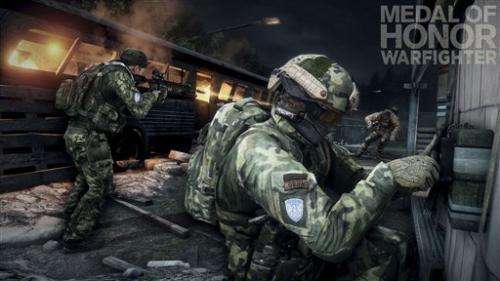
(AP)—The U.S. military is cracking down on special operations troops who share knowledge of their secret missions for profit, punishing seven Navy SEALs, including one involved in the mission to get Osama bin Laden, who moonlighted as advisers on a combat video game.
Current and former SEALs, including the author of a tell-all book on the bin Laden raid, complain they’re getting mixed messages from the military, which likes to see itself on big and small screens on its own terms.
The seven SEALs are being reprimanded and having their pay docked for sharing information with the designers of “Medal of Honor: Warfighter,” by video game company EA, according to military officials speaking on condition of anonymity because they were not authorized to discuss the investigations publicly.
The men will remain in the SEAL teams, but were punished for working on the video without their command’s permission, revealing classified information by sharing the tactics they use and showing designers some of their specially designed combat equipment unique to their unit, the officials said.
Four more SEALs could face the similar punishment.
The deputy commander of Naval Special Warfare Command, Rear Adm. Garry Bonelli, issued a statement acknowledging that nonjudicial punishments had been handed out for misconduct, but he did not offer any details.
“We do not tolerate deviations from the policies that govern who we are and what we do as sailors in the United States Navy,” Bonelli said. He alluded to the importance of honoring nondisclosure agreements that SEALs sign.
He said the punishments this week “send a clear message throughout our force that we are and will be held to a high standard of accountability.”
The SEALs’ unauthorized work came to light as part of the investigation of the book “No Easy Day,” by former SEAL Matt Bissonnette, with his firsthand account of the raid that killed bin Laden in Pakistan last year. Publisher Penguin’s Dutton Imprint ignored the Pentagon’s warnings that the book contained classified information and published the book just ahead of the 11th anniversary of the Sept. 11th attacks.
The Pentagon would have a hard time proving the video game makers had disseminated classified information that threatened national security because the combat tactics shown in the game are common to games and action movies, said Mark Zaid, a Washington-based national security attorney who regularly handles cases involving secrecy agreements and classified information.
EA spokesman Peter Nguyen said the company has no plans to recall “Medal of Honor: Warfighter,” and there are “no plans to alter the content contributed by combat veterans in the game.” He would not elaborate.
“EA didn’t break any rules,” said Michael Pachter of Wedbush Securities, an investment firm that follows video game companies. “It’s not against the law for them to ask questions.”
Video game companies often use military consultants for games in order to make them as realistic as possible.
The Xbox 360 version of the game scored poorly on with just 52 points out of 100 on Metacritic, a gaming website that aggregates reviews, Pachter said.
Pachter expects the latest “Medal of Honor,” which launched on Oct. 23, to sell 3 million copies. The “Call of Duty” games routinely sell more than that in their first day in stores.
The SEALs who were punished for helping with the game were all members of Bissonnette’s old unit, SEAL Team 6. Officials say Bissonnette drafted his friends from his old unit SEAL Team 6 to work on the video game—a common practice among the SEAL teams, where current and former members help trusted teammates to find work.
Current and former special operators troops complain there’s a double standard when it comes to publicizing details of their missions. This year’s movie “Act of Valor” was filmed with the Pentagon’s approval and featured active-duty Navy SEALs, showing off the methods they use on the battlefield. Navy officials say they worked with the filmmakers as a recruiting tool and that unlike the video game, or the Bissonnette raid book, the filmmakers gave them an opportunity to review the film for classified material. They also point out that the SEALs in that movie were unpaid.
“I don’t know if terrorists can just take from a video game tactics … but it does speak to a bigger issue that just, hey, if you’re not authorized to give out information or speak about information, then you have to be held accountable,” said former Navy SEAL Scott Taylor, now with Special Operations OPSEC, a political advocacy group that criticized the Obama administration during the presidential campaign for releasing details of the bin Laden raid.
The head of Naval Special Warfare Command, Rear Adm. Sean Pybus, responded to the Bissonnette book by telling his force that “hawking details about a mission” and selling other information about SEAL training and operations puts the force and their families at risk.
Members of the SEAL community have been embarrassed by the rash of books and films about the elite force, and some SEALs say they fear top secret missions will now be given instead to units whose members keep quiet.